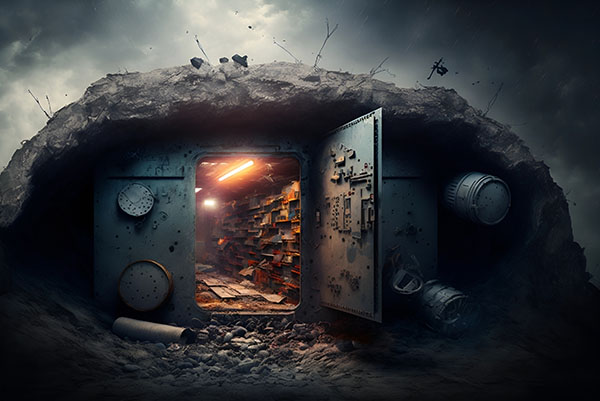Health Ranger Report: How Francesco Garripoli’s retreat center WITHSTOOD Hurricane Helene’s fury
- The hurricane caused unprecedented destruction in Asheville, North Carolina, washing away roads, collapsing bridges and submerging entire towns, leaving communities isolated without power, water, or communication.
- Francesco Garripoli’s retreat center, designed with disaster preparedness in mind, remained intact. Features included underground utilities, bedrock-bolted structures, a deep well system and a community-owned power source, showcasing the importance of foresight and infrastructure.
- A seasoned survivor of natural disasters, Garripoli emphasized the need for mental, spiritual and physical preparedness, advocating for calm decision-making and self-reliance over dependency on external systems.
- Garripoli highlighted society’s over-reliance on government and corporations, which has eroded basic survival skills. He urged people to use disasters as opportunities to learn and develop resilience.
- Garripoli’s approach serves as a model for building resilient communities and systems in an increasingly fragile world, emphasizing the urgency of preparedness, self-reliance and community strength.
As Hurricane Helene tore through Asheville, North Carolina, leaving a trail of devastation in its wake, one man’s retreat center stood as a beacon of resilience.
Francesco Garripoli, a Qigong teacher and founder of the nonprofit Community Awake, had meticulously prepared his eight-acre sanctuary, the Wuji Mountain retreat center, for such a catastrophe. While the surrounding area faced unimaginable destruction – roads washed away, bridges collapsed and entire towns submerged – Garripoli’s retreat center remained intact, a testament to the power of foresight, self-reliance and community.
A storm beyond imagination
Hurricane Helene was no ordinary storm. Garripoli, a seasoned survivor of hurricanes and cyclones from his time living in Florida, Hawaii and Hong Kong, described it as the worst he had ever witnessed. (Related: Hurricane Helene leaves millions without power and dozens dead… and the post-storm situation is only getting worse)
“Roads that have been in place for 100 years are completely gone,” the internationally recognized senior Qigong teacher recounted during a “Health Ranger Report” interview with Mike Adams. Bridges that withstood previous storms are now rubble and towns like Marshall, which was built to endure a 19-foot river surge in 1916, were submerged under 27 feet of water.
The devastation was surreal. Entire communities were cut off with no power, no water and no way to communicate. Yet amidst the chaos, Wuji Mountain stood firm.
The blueprint for survival
Garripoli’s retreat center was designed with disaster readiness in mind. “We don’t wait for emergencies to be prepared,” he stated while adding that they built the retreat center to last. The infrastructure of Wuji Mountain is a masterclass in preparedness:
- All utilities, including a 2000-foot fiber optic cable, were buried to protect against storms.
- The main building is anchored to bedrock with 12-inch reinforced concrete and rebar, ensuring stability even in extreme conditions.
- A 545-foot well provides a reliable water source, while a 100-gallon rain catchment system offers additional backup.
- Connected to the French Broad Electric Coop, a nonprofit hydroelectric provider, Wuji Mountain had power restored within four days.
Garripoli’s approach goes beyond physical infrastructure. He emphasized the importance of mental and spiritual preparedness. The author and brainwave researcher stated that a person should not allow fear to dictate their actions but rather learn to stay calm and make wise choices.
A wake-up call for self-reliance
The aftermath of Hurricane Helene exposed a troubling reality: Many people are woefully unprepared for disasters. Garripoli took note that people have been conditioned to depend on big government and corporations which has led to the loss of basic skills of survival.
This disconnect from nature and self-reliance is a symptom of a larger societal issue. Garripoli’s story serves as a wake-up call.
“Don’t let a good disaster go to waste,” he stated, adding that people should learn from the challenges and hone their skills.
A model for the future
Garripoli’s story is more than a survival tale, it’s a blueprint for the future. In a world increasingly reliant on fragile systems, his approach to preparedness, self-reliance and community resilience offers a path forward.
As Hurricane Helene’s devastation continues to unfold, one thing is clear: the time to prepare is now. Whether it’s storing food, learning survival skills, or building stronger communities, the lessons from Wuji Mountain are a call to action for us all.
In the face of disaster, resilience is not just about surviving – it’s about thriving.
Watch the full interview between Francesco Garripoli and the Health Ranger Mike Adams below.
This video is from the Health Ranger Report channel on Brighteon.com.
More related stories:
Unbreakable spirits: The RESILIENCE of North Carolina’s flood-ravaged communities.
The importance of mental resilience in crisis situations: Strategies for staying calm when SHTF.
Disaster preparedness: 4 Levels of disasters and how to prepare for each one.
Sources include:
Brighteon.com
CommunityAwake.org 1
CommunityAwake.org 2
Read full article here


